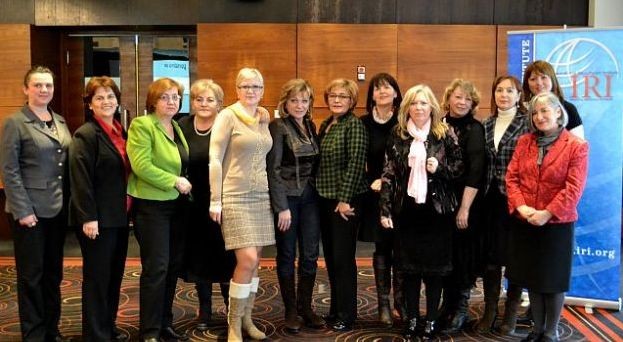Home » Reports & Data » Progress » Transforming Lives » Women’s Caucus Is a First for Bosnia and Herzegovina

Members of the Federation of BiH Women’s Caucus
FBiH Women's Caucus
Parliamentarians cross parties to focus on gender equality issues
“Since the caucus was formed, the political and work climate in the parliament has changed.”
Going against the tide of politics and tradition in Bosnia and Herzegovina (BiH), women parliamentarians have come together to form the country's first issues-based caucus, one that centers on common interests rather than party platforms.
With USAID support, 22 women members of the House of Representatives of the Federation of BiH (FBiH), one of the country’s two governmental entities, united to form the caucus in early 2013. It was the first women’s caucus in the entire region.
“I felt powerless when I was proposing amendments by myself. As an individual woman in [FBiH] politics, one often feels helpless,” said Jasmina Zubic, a member of the FBiH Women’s Caucus. “Since the caucus was formed, the political and work climate in the parliament has changed.”
The work of the caucus and of other women in BiH is helping to shift the focus of political dialogue from male-dominated nationalist rhetoric to common goals of women from various political, economic and social spheres.
“Even the way the media is following the work of the parliament has changed. If you look carefully, you can see more of us in the news. More journalists are approaching us and asking for our opinion. This caucus and our work makes me feel powerful,” Zubic said.
The caucus, created through USAID’s Political Processes Support Program, will help ensure that gender equality issues are mainstreamed across the work of the parliament. It will focus primarily on legislative initiatives that improve the position of women regarding maternity leave, improved childcare and equal employment, including budget allocations.
“It is not acceptable to have budgets adopted without even the smallest amounts of subsidies, grants or other funding directed to support women’s entrepreneurship or women in agriculture, who in the Federation hardly get any financial support at all,” said Caucus Chairwoman Hafeza Sabljakovic, noting the importance of creating the women’s caucus in the FBiH Parliament.
Caucus members have already prepared and submitted amendments to the Federal Criminal Code to increase sanctions for perpetrators of domestic violence and violence against children. To help push the women’s agenda forward, the caucus aims to have women constitute 40 percent of the candidates on party lists for the 2014 elections.
“In other words, we want to [harmonize] the election law with the law on gender equality,” Sabljakovic said. “And our aim is not only having 40 percent of women as candidates, but to have the same percentage elected,” she said.







Comment
Make a general inquiry or suggest an improvement.